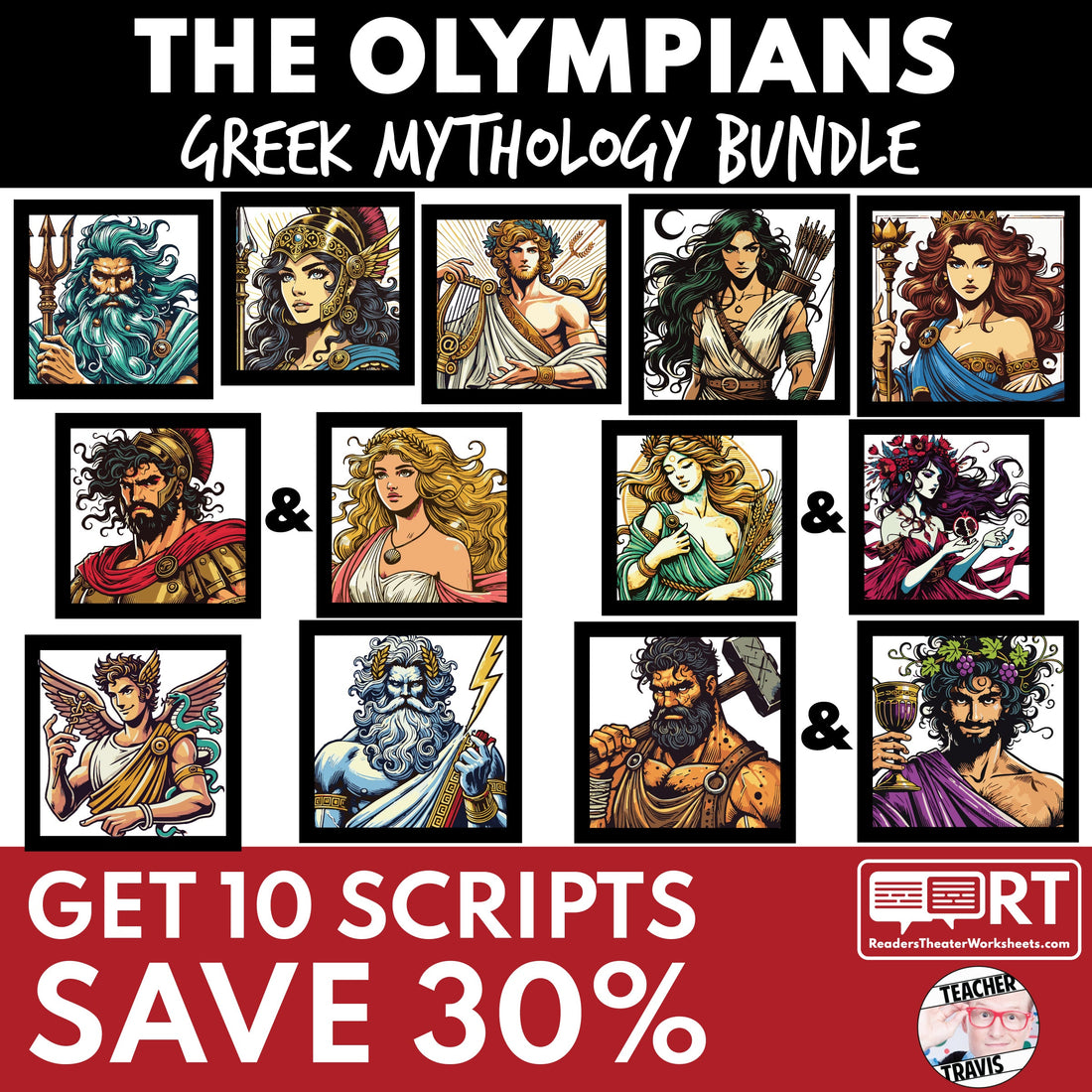
10 Readers Theater Scripts Bundle for Greek Mythology in High School
Share
For high school teachers of grades 9-12 diving into the rich tapestry of classical literature, ancient history, or social studies, teaching the Olympian gods of Greek mythology can sometimes feel like a battle against dense texts and disengaged teens. You’ve likely seen it: students skimming tales of Zeus’s reign or Athena’s wisdom, missing the drama of ancient Greece. What if you could trade the monotony for a dynamic, interactive experience that has students voicing the gods, debating their motives, and connecting with history? Enter the Olympian Gods of Greek Mythology Readers Theater Scripts Bundle (10)—available at a 30% discount at Readers Theater Worksheets.
This post explores how this bundle—featuring 10 scripts on the Olympian gods—can transform your high school classroom, engaging students with dialogue-driven myths that bridge classical literature and ancient history for social studies and history teachers.
Why Readers Theater Fits Greek Mythology in High School
Readers theater transforms ancient myths into performances, emphasizing voice and interpretation over props, making it ideal for grades 9-12. For social studies and history teachers, it’s a gateway to explore Greek culture and power dynamics; for classical literature educators, it animates epic narratives. Here’s why it works:
-
History Speaks: Students don’t just read about Poseidon’s trident—they wield it, linking myths to ancient Greek society.
-
Debate Ignites: Voicing Hera’s jealousy or Ares’s fury sparks discussions on gender, war, and governance in antiquity.
-
Repetition Deepens Insight: Rehearsing Apollo’s prophecies or Hades’s underworld reinforces classical terms and historical context.
-
Ancient Values Emerge: From Zeus’s authority to Aphrodite’s influence, teens connect mythic themes to social structures of the past.
Spotlight: Olympian Gods of Greek Mythology Readers Theater Scripts Bundle
The Olympian Gods of Greek Mythology Readers Theater Scripts Bundle (10) brings the classical world to your high school classroom, available at Readers Theater Worksheets. With a 30% discount, it’s a cost-effective tool for grades 9-12 social studies, history, and literature teachers. Here’s what’s inside:
10 Olympian Epic Scripts covering all 12 Olympian Gods: Each script (5-10 pages, ~30 minutes) spotlights a major god, tailored for high school complexity. Gods include:
1. Zeus: The thunderbolt-wielding ruler of Olympus, upholding justice across the sky, swallowed at birth by Cronus, and overthrows the Titans.
2. Poseidon: The trident-bearing lord of the seas, stirring earthquakes and taming horses, ruling the oceans with unrelenting power.
3. Hera: The crowned queen of the gods, guarding marriage with jealous wrath, punishing disloyalty among gods and mortals alike.
4. Athena: The wise strategist of war, guiding civilization with intellect, born from Zeus’s skull to patronize Athens.
5. Apollo: The radiant charioteer of the sun, delivering prophecies and healing, strumming melodies that enchant the world.
6. Artemis: The moonlit huntress of the wild, protecting childbirth with her bow, roaming free as nature’s fierce guardian.
7. Hermes: The swift-winged messenger of the gods, mastering trickery and commerce, guiding travelers and thieves with sly charm.
8. Ares & Aphrodite:
-
Ares: The bloodthirsty spear of war, reveling in battle lust, driving chaos and destruction across fields of strife.
-
Aphrodite: The enchanting vision of love, weaving passion and beauty, born from sea foam to sway hearts and fates.
-
Ares and Aphrodite are paired to explore the clash and fusion of love and war, their infamous affair highlighting passion’s power to fuel destruction.
9. Hephaestus & Dionysus:
-
Hephaestus: The lame smith of the forge, crafting divine wonders, turning exile into brilliance with fire and hammer.
-
Dionysus: The wild vintner of revelry, spilling wine and madness, rising from mortal roots to claim Olympian theater.
-
Hephaestus and Dionysus are united as outcasts who defy rejection, their craftsmanship and ecstasy forging unexpected paths to glory.
10. Demeter & Persephone:
-
Demeter: The fertile sower of agriculture, enforcing sacred law, freezing earth in grief to reclaim her stolen child.
-
Persephone: The dual-crowned queen of spring and shades, balancing life and death, abducted to rule the Underworld’s gloom.
-
Although not an Olympian, Persephone is combined with Demeter to weave a tale of mother and daughter, their Olympian and chthonic reigns shaping the eternal cycle of seasons.
-
Teaching Tools Included: Each script offers a teacher’s guide with CCSS-aligned tips, answer keys, and discussion prompts tying myths to history and literature, plus worksheets with 10 vocabulary words (e.g., “oracle,” “pantheon”), 10 comprehension questions, and 3 reflection prompts. Formats: Google Docs, PDFs, Google Slides.
-
Flexible & Affordable: With 15~30 characters per script, roles adjust for any class size—split gods for larger groups or combine mortals for smaller ones. At a 30% discount, it’s a budget-friendly digital resource.
Scripts run ~30 minutes, with added time for rehearsal, discussion, and analysis, fitting perfectly into high school class periods or extended units.
The Impact on Your Students
Readers theater makes ancient Greece resonate. A ninth-grader thunders as Zeus, a senior schemes as Hermes—both sharpen speaking skills and historical insight. For social studies and history, it’s a lens into classical culture; for literature, it’s a live epic. This bundle turns passive readers into active scholars of antiquity.
Get Started Today
For high school teachers seeking “Greek mythology scripts for social studies” or “classical literature readers theater for grades 9-12,” the Olympian Gods of Greek Mythology Readers Theater Scripts Bundle (10) is indispensable. Grab it at Readers Theater Worksheets and watch your students command the classics—one divine performance at a time.
